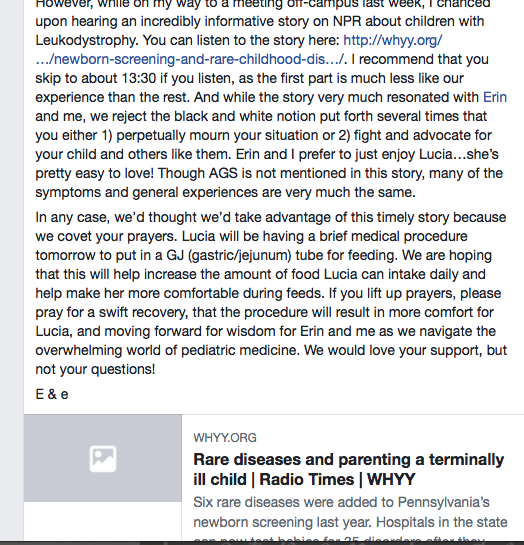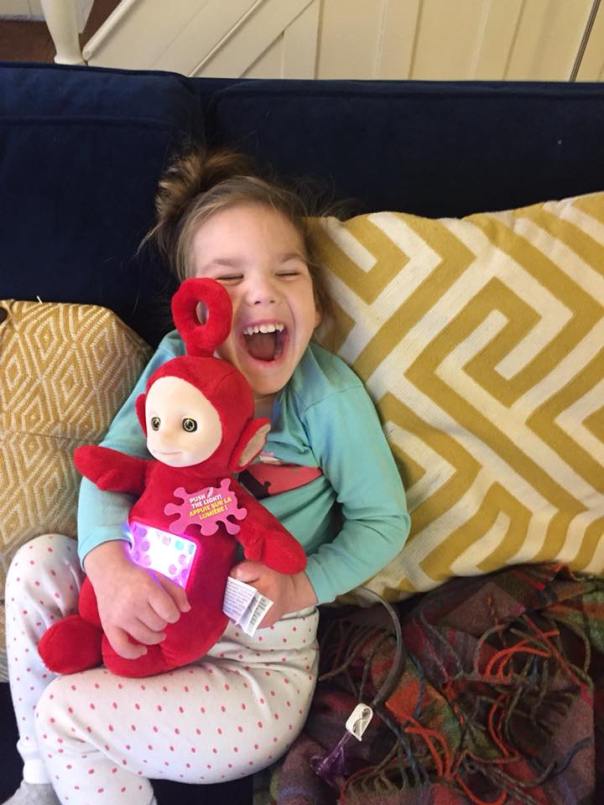The other evening a few of my friends indulged me in asking about my summer research project on disability and joy. I yammered on a bit about my excitement about what I might learn from families with persons with disabilities who are nonverbal, and then my husband spoke up. He talked about the presumed extremes and edges for families raising children with disabilities, especially children with rare and life-threatening conditions like ours. “Either you’re at one extreme, devoting all your time and energy into fighting this disease and finding a cure, or you’re slumped over on the couch, defeated and depressed, resigned and remorse that life is so cruel and painful.”
Of course, I’m paraphrasing. Although my husband has spoken of these extremes often, down to the very way he first framed our public announcement of Lucia’s diagnosis, I’m not sure it had ever occurred to me how these hostile extremes prey upon and distort the reality of life as we know it with Lucia. Why didn’t I think to frame my project this way, I thought? After all, isn’t it this insidious framing that makes the pairing of “disability and joy” so presumably unexpected and rare?

These stereotypes about parents of kids with special needs, made it and continue to make it really hard for me to open up as Lucia’s been in a really trying and uncertain period of feeding intolerance. In our first ethnographic interview for the project this week, one of the parents spoke eloquently about the burden of communication that’s placed on she and her husband to keep the world appraised of her child’s medical status and progress report. A few weeks ago on a Sunday where I’d finally resolved to open up about how overwhelmed my husband and I felt about Lucia’s feeding difficulties, I quickly found myself sandwiched between two platitudes–the one about God giving special kids to special parents and the other about kids being able to overcome their disabilities with hard work, and I just wanted to scream.
When well-meaning friends jump so quickly to wishing life was otherwise for us and striving to help we and Lucia overcome all her challenges, I feel shortchanged and silenced, because it starts to feel like our life’s everyday difficulties come as such disappointments to others, and then I feel the burden of having to help others find narratives of progress amidst our very chronic, circular story. Of course you wish the best for us, but when that comes at the cost of your narration and my silence, I can’t help but feel you’re wishing away so swiftly and expertly the difference between us, without acknowledging that that difference is where my family and I live. I know it may sound harsh, but in these moments I often feel as though people would rather experience my family’s thriving or failing as a spectator sport, watching from a distance, finding some sentimentality in it, and then going back to their regularly scheduled lives, buffered by that comfortable (manmade) chasm between us and our seemingly very different realities.
I’m aware that neither my humble ethnographic project nor my blog posts can suddenly or significantly alter the cultural scripts surrounding families with family members with disabilities (let alone people with disabilities, especially people who are nonverbal, but that’s for another post…), but I do believe there is great power in helping families tell their stories as they want them to be told.
When I came home from church that evening a bit emotionally battered and bruised, I thought about why those conversations stung so much. They stung because the truth was that amidst great hardship, I didn’t feel that things were just hard on the eve of Lucia’s fourth birthday, I also felt exceedingly grateful. And so I began to write parts of this post and I resolved to try again. Yet another Sunday, I told my story with its mix of grace and hardship and beauty and pain and joy, oh yes, deep, resounding joy, to a few members of another family during coffee hour. I remember the concerned look on their faces, their heads nodding, I don’t remember much of anything they said, but I certainly remember how I felt. To be accepted as I was, not really by their words, but by their nods and their faces and their hearts, was like a balm to my soul.

They did me the honor and ministry of letting my story hang between us, but what may have been slightly uncomfortable to them felt so freeing and resonant and powerful to me. I realized that I have tentatively decided to share my story on this blog over and over not always even so that others can understand, let alone feel better, but so that in this swarming world that buzzes and pulses and consumes and compresses my daughter’s life into sound bytes and platitudes and pity, I can simply hear my own voice. I know it sounds selfish to put it that way, but perhaps the battle that parents with kids with disabilities are fighting is not primarily one against disease or difficulties but against the perception that their kids lives don’t matter or that their kids aren’t like other kids or their families aren’t like other families, because they can be summed up in stereotypes that pronounce their differences in cruel, inhuman ways. The isolation isn’t primarily physical but social, one where you find yourself telling a story that should be yours but that either no one else wants to hear, or everyone else wants to narrate, resolve, and redress for you.
But stories always have more complexity, a life of their own, and depth beyond what we can ever imagine. They’re just one more fabulous aspect of what makes us human–that we all have a story to tell.
Thank you for letting me share some of mine. And thank you, most of all, for really hearing it.
Thank you for sharing.
Thank you for your comment, Mimi.
Thank you, Erin. I am listening.
Thank you, namesake!
Thank you for this. There were so many parts of this post that put to words things I feel but haven’t been able to articulate myself. Beautifully written.
Thank you, Kristin.
Wow! Such a lovely and cute daughter you got!!! Great!!
Thank you for you kind comments!
Thank you for the chance to dialogue. Katie O-Hern just sent me the link to your blog and I have lots to share about our family and lots more to learn about yours.
So good to connect with you, John!